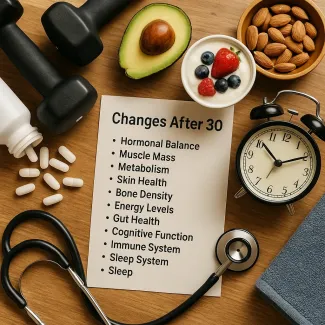
How Berberine Naturally Supports Glucose Levels and Metabolism
Unlocking the power of a traditional compound for modern metabolic challenges
Berberine has emerged as one of the most talked-about natural supplements for those looking to improve their blood sugar control, weight management, and overall metabolic health. This powerful alkaloid compound, extracted from plants like barberry and goldenseal, has gained global attention for its potential to act on multiple metabolic pathways in the body.
What sets berberine apart is its ability to impact glucose metabolism, insulin sensitivity, and even gut microbiota, offering a natural way to support core aspects of health that often begin to shift after the age of 30. Unlike isolated vitamins or minerals, berberine operates on a multi-target mechanism, providing broad-spectrum benefits that are both scientifically intriguing and practically valuable for people dealing with metabolic syndrome, pre-diabetes, or persistent blood sugar fluctuations.
Understanding how berberine works in the body
Mimicking the action of insulin
One of the most promising aspects of berberine is its insulin-like effect. It helps cells absorb glucose more efficiently, thereby reducing the amount of sugar circulating in the bloodstream. This process does not rely solely on insulin itself, making berberine particularly valuable for individuals whose insulin sensitivity is diminished or who are experiencing signs of insulin resistance.
Activating AMPK, the metabolic master switch
Berberine stimulates an enzyme called AMP-activated protein kinase (AMPK), often referred to as the body's metabolic master switch. AMPK plays a crucial role in regulating energy homeostasis. When activated, it promotes fat burning, enhances glucose uptake, and suppresses liver glucose production. These combined effects lead to a natural and steady improvement in metabolic function, often noticeable through more stable energy levels and better appetite control.
Supporting healthy lipid profiles
Another important function of berberine is its ability to support healthy cholesterol and triglyceride levels. Research shows that it may reduce LDL (bad) cholesterol, while increasing HDL (good) cholesterol, contributing to cardiovascular health alongside metabolic improvements.
Key benefits of berberine for daily health
Stabilizing blood sugar levels
One of the most well-known uses of berberine is for managing post-meal glucose spikes. People who take berberine regularly often report fewer energy crashes, less brain fog after meals, and improved concentration during the day. This is especially important for individuals with fluctuating blood sugar, who are trying to avoid long-term complications or dependency on stronger pharmaceuticals.
Enhancing insulin sensitivity
Berberine helps restore cellular responsiveness to insulin, which is vital for maintaining long-term metabolic balance. This action is particularly beneficial in pre-diabetic stages or when early signs of metabolic syndrome are detected, such as abdominal fat gain, elevated fasting glucose, or persistent tiredness after eating.
Supporting weight management
Although berberine is not a weight-loss pill, its influence on appetite regulation, gut flora balance, and fat metabolism makes it a helpful tool for those looking to support a healthy weight. Many users experience gradual body recomposition, especially around the waistline, where visceral fat tends to accumulate due to hormonal and insulin imbalances.
Encouraging hormonal balance
In women experiencing PCOS-related symptoms or hormonal irregularities tied to blood sugar imbalance, berberine may offer support by modulating endocrine function, especially when combined with a well-structured lifestyle that includes nutrient-dense food, stress management, and restorative sleep.
Who can benefit most from berberine supplementation?
Adults over 30 dealing with energy dips or metabolic slowdown
As the body naturally undergoes hormonal changes and reduced mitochondrial efficiency after age 30, many people begin to notice signs like persistent fatigue, difficulty losing weight, and mild insulin resistance. Berberine can be particularly effective for this age group because it addresses several metabolic issues simultaneously.
People with signs of metabolic syndrome
Berberine is well suited for individuals showing multiple warning signs such as elevated triglycerides, waist circumference gain, mild hypertension, and blood sugar fluctuations. Its broad action supports multiple health goals without requiring high doses or complex regimens.
Those with family history of type 2 diabetes
For people with a genetic predisposition to blood sugar problems, preventive use of berberine might support insulin signaling and mitochondrial performance, helping to delay or mitigate the onset of chronic glucose regulation issues.
Individuals experiencing brain fog, mood shifts, and cravings
Because blood sugar swings can affect mental clarity, emotional regulation, and impulse control, berberine can offer subtle but impactful improvements. Many users report sharper focus, more stable mood, and reduced cravings, especially for refined carbohydrates.
How to use berberine for optimal results
Effective dosage and timing
A common daily dosage of berberine ranges from 900 mg to 1,500 mg, usually divided into two or three doses taken with meals. This helps reduce the risk of gastrointestinal discomfort while also syncing berberine’s action with postprandial glucose metabolism.
Consistency is key—berberine is not a fast-acting compound like caffeine, but rather a daily support tool that yields results over weeks of use.
Combining berberine with lifestyle changes
To maximize berberine's benefits, it's best to pair supplementation with smart nutritional choices, moderate physical activity, and regular sleep cycles. For instance, combining berberine with a low-glycemic diet, rich in fiber, healthy fats, and lean proteins, enhances its metabolic impact.
Monitoring how your body responds
Because berberine can affect blood sugar, individuals already taking medications for diabetes or hypoglycemia should track their glucose levels carefully when introducing this compound. In general, the effects are gentle, but cumulative, and align well with natural rhythm restoration.
The gut connection: berberine’s microbiome benefits
Modulating gut flora
Berberine has been shown to influence the composition of the gut microbiota, encouraging the growth of beneficial bacteria such as Akkermansia muciniphila, which is associated with lean body mass, reduced inflammation, and improved insulin sensitivity.
Supporting digestion and nutrient absorption
A healthy gut environment supported by berberine may also improve the body’s ability to absorb key nutrients from food, reducing inflammation and enhancing general vitality. This makes berberine especially suitable for those with digestive discomfort, bloating, or inflammatory bowel tendencies.
Addressing fatigue and mitochondrial function
Restoring cellular energy production
Berberine supports ATP production, the energy currency of cells, by improving mitochondrial function and glucose metabolism. This can have wide-ranging effects on daytime energy, exercise recovery, and mental sharpness.
Combating persistent tiredness
If you often feel tired despite resting, berberine might help address root causes related to glucose dysregulation or poor mitochondrial efficiency, helping your body use fuel more efficiently instead of storing it as fat.
Managing cravings and appetite naturally
Reducing sugar cravings
Because berberine improves glucose transport and insulin efficiency, it indirectly helps reduce blood sugar crashes, which are a major driver of cravings for refined carbohydrates and sugary snacks. Many users find themselves less drawn to snacks between meals, making it easier to maintain a nutritionally stable eating pattern.
Supporting satiety hormones
Berberine may also modulate ghrelin and leptin, the hormones responsible for hunger and fullness, contributing to more balanced meal timing and less overeating, especially in the evening hours.
Safety and tolerability of berberine
Mild and manageable side effects
Most people tolerate berberine well, especially when doses are introduced gradually. Some users may experience mild digestive changes, such as bloating or softer stools, which often disappear after a few days of consistent use.
Who should be cautious?
Pregnant or breastfeeding individuals, as well as those with existing liver or kidney issues, should speak to a health professional before beginning berberine. It's also important to monitor for drug interactions, particularly with blood pressure or blood sugar medications.
Daily routine tips for integrating berberine
- Take 300–500 mg per dose, 2–3 times daily with meals.
- Track your energy, appetite, and focus over 3–4 weeks.
- Pair with a Mediterranean-style or low-carb diet for optimal synergy.
- Prioritize morning and afternoon doses, especially before carb-rich meals.
- Hydrate well and support digestion with probiotic-rich foods.
Additional advantages: anti-inflammatory and longevity effects
Berberine also shows potential in reducing systemic inflammation, particularly low-grade inflammation associated with aging, poor diet, and sedentary lifestyle. It may even support cellular longevity, making it a compelling option for those seeking not just short-term fixes but long-term vitality.
Its capacity to modulate markers like CRP (C-reactive protein) and inflammatory cytokines suggests a place for berberine in broader anti-aging strategies, especially when used as part of a daily health foundation rather than a temporary trend.





